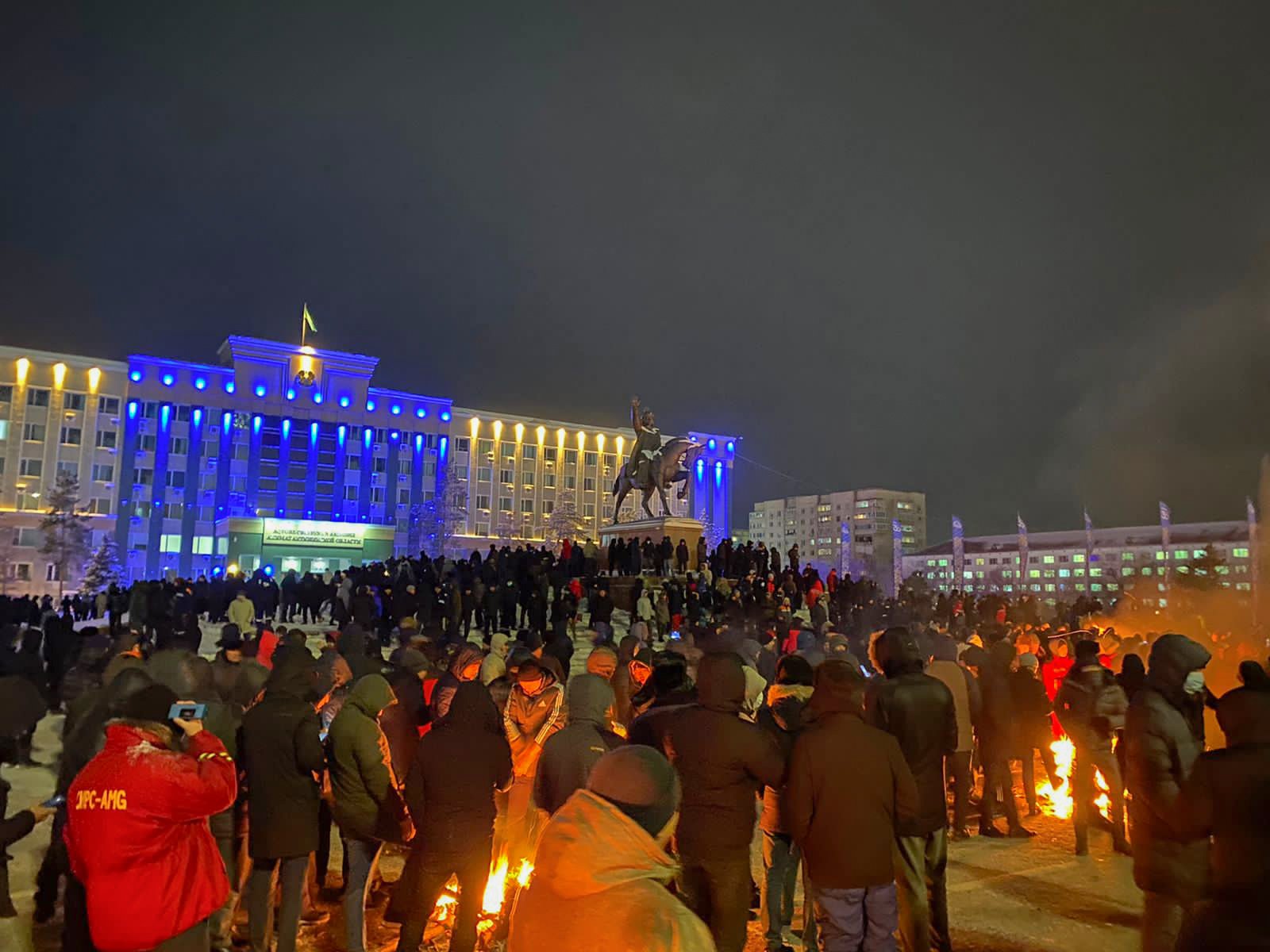"Shoot to Kill Without Warning"
Photo Credit and Caption: January 4 protests (Esetok via Wikipedia)
Kazakhstan rang in the new year with deadly protests. Similar to the 2020 protests in Thailand, a small, seemingly isolated demonstration quickly spread a wave of discontent across the country. Taking a page from Myanmar's military junta's playbook, President Kassym-Jomart Tokayev has restricted internet access and given security forces the authority to "shoot to kill without warning." Should other countries intervene?
Gas prices opened tender wounds. On New Year's Day, the price of liquefied petroleum gas (LPG), which is often an inexpensive alternative to gas, doubled in western Kazakhstan. An unexpected price increase in the oil-rich region led to immediate protests in the city of Zhanaozen, which is not surprising given its recent history. December 2021 marked the nation's 10th anniversary of a labor boycott and subsequent massacre. In December 2011, oil workers staged a peaceful six-month strike to demand higher wages and establish labor unions. In Kazakhstan, leaders do not typically respond to any form of dissent diplomatically. Security forces killed at least 16 people and injured dozens more in 2011. Several weeks ago, residents memorialized murdered loved ones and recognized neighbors who had bravely shared video evidence, proving the veracity and horror of the massacre. Between rising unemployment and calls for living wages, the atmosphere in Zhanaozen was ripe for protest when gas prices rose dramatically.
"Shoot to kill without warning." Deutsche Welle reported that demonstrators shut down Almaty's airport. Almaty is a cultural and commercial hub for Kazakhstan and a crucial transportation center for the Central Asian region. When acknowledging escalating resistance to his administration, President Tokayev said, "terrorist gangs are seizing large infrastructure facilities, in particular in the Almaty airport, five planes, including foreign planes. Almaty has been attacked, destroyed, and vandalized." This morning, Al Jazeera said that the president has asked security forces to "shoot to kill without warning." The interior minister said that 26 protestors have been "liquidated," and more than 3,000 others have been detained. According to ABC News, at least a dozen police officers have been killed, including one who was decapitated.
The geography of Russian roulette. President Tokayev has asked for Russia's assistance and the Russian-led Collective Security Treaty Organization (CSTO) that includes Armenia, Belarus, Kyrgyzstan, and Tajikistan. Russia is in the midst of military intervention. Fariz Ismailzade, with ADA University, told Al Jazeera that Kazakhstan's leaders claim that the intervention will stop "Islamic radical elements from organizing the protests." He added that this is "hardly believed by local citizens because the initial protests were organized by ordinary citizens." Russia has affirmed that position and, in part, blames the U.S. for the conflict. Anatoly Antonov, Russia's ambassador to the U.S., said that "there is serious concern over further spread of radical religious ideology in Central Asia." In that discussion with Newsweek, he added, "It comes from the destabilization in the Middle East, and Afghanistan caused, in turn, by the Western military interferences under the pretext of defending human rights and democracy."
Share the latest information widely. Right now, people in Kazakhstan do not have access to the internet, and their borders are closed. This means that their stories are largely being told in bits and pieces by journalists and diplomats. Kazakhstan is not often at the top of the news cycle in Western media, so there's a high probability that your friends and family may not have current information. Frustrating for the people in Kazakhstan, it does not look like any other countries plan to intervene, and there is little information about whether or not there will be coordinated humanitarian aid efforts. The UN High Commissioner for Human Rights, Michelle Bachelet, has urged the government to restore internet services. Until that occurs, we can help share the latest news on what's happening in Kazakhstan.



